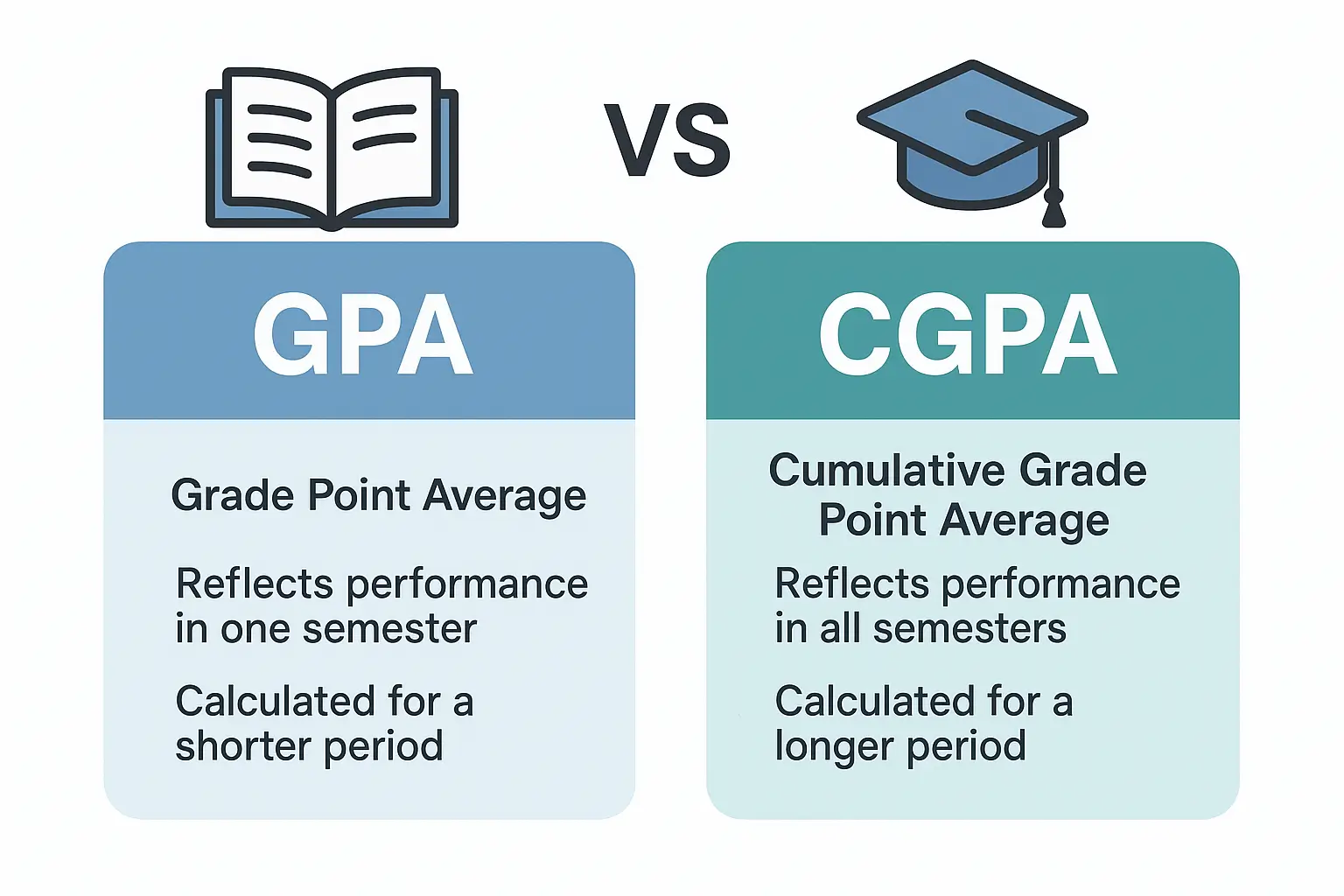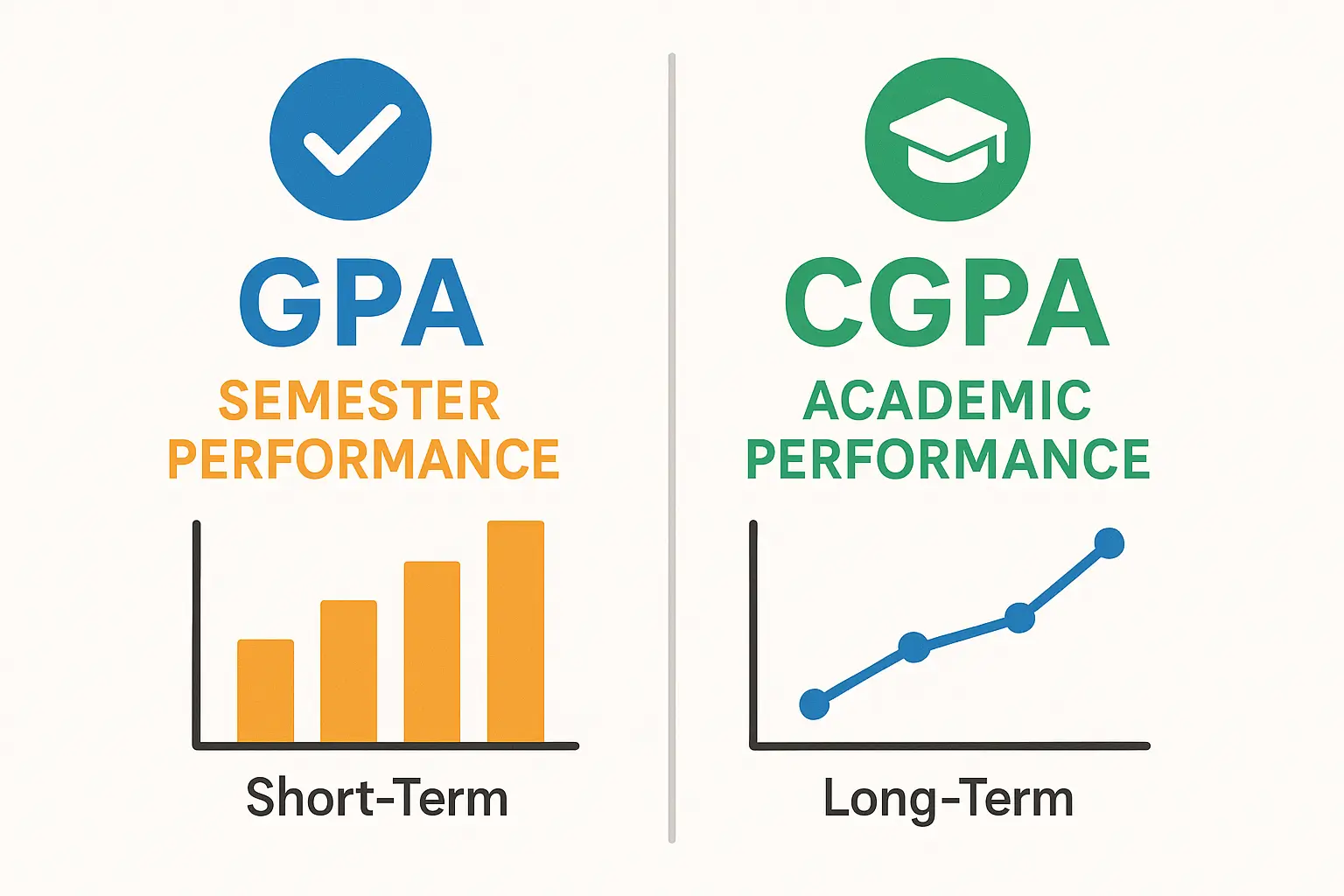GPA vs CGPA: Key Differences, Meaning & Calculation Explained
Introduction
Nowadays, the focus is not just on studying and getting good marks. Today, the grading system has also become an important factor. Whether you are in school, college, or preparing for the next exam, it is very important to understand your grades and use them correctly.
Earlier, people used to focus only on marks (numbers), but now grades (such as A, B, C) also matter a great deal. The grading system shows your performance in a structured way.
This system mainly uses two grading scales worldwide: GPA (Grade Point Average) and CGPA (Cumulative Grade Point Average). But a common confusion among students is “What is the difference between GPA and CGPA?” and “Which is more important - CGPA vs GPA?”
In this article, we will see step by step what GPA and CGPA are, how they are calculated, what the key differences between them are, and which strategies you should follow to improve them.

What is GPA?
The full form of GPA is Grade Point Average. It is a numerical value that represents your performance over a semester or a specific time period.
In simple terms, GPA is a short-term indicator that reflects the average performance of your courses in a semester.
How GPA Is Calculated
Formula of GPA
This is the general formula for calculating grade point average:
GPA = (Total Grade Points Earned * Credit Hours) / Total Credit Hours Attempted
Role of Credit Hours in GPA
Credit hours play a crucial role because each course has a different weightage. For example, a 3-credit course will have more weight as compared to a 1-credit course. If you score a lower grade in a 3-credit course, it will have a stronger negative impact on your GPA.
Types of GPA
Semester GPA vs Cumulative GPA
- Semester GPA: It only measures the performance of a particular semester.
- Cumulative GPA: Calculates the average of multiple semesters, but it is still not as long-term as CGPA.
Weighted vs Unweighted GPA
- Unweighted GPA: Usually, it is on a scale of 0–4, giving equal weightage to all courses.
- Weighted GPA: Honors, AP, or advanced courses have extra weight (e.g., on a 5.0 scale).
Real-life Example: GPA Calculation for a Single Semester
Suppose you took 4 courses in one semester:
- Total Credit Hours = 12
- Total Weighted Points = 38
What is CGPA?
Definition of CGPA (Cumulative Grade Point Average)CGPA stands for Cumulative Grade Point Average. It is a performance indicator of your overall academic journey. In simple words, CGPA is the cumulative average of all semester GPAs.
How CGPA Is Calculated
This is the formula used to calculate CGPA (Cumulative Grade Point Average).
CGPA = Total Grade Points Earned in All Semesters ÷ Total Credit Hours in All SemestersGPA to CGPA Conversion (with Example)
Suppose this is your semester's GPA:
- Semester 1 = 3.2
- Semester 2 = 3.5
- Semester 3 = 3.8
- Semester 4 = 3.4
Importance of CGPA
- Role in Overall Academic Performance
- CGPA shows the long-term consistency of a student. If one semester’s GPA is a little low, but the rest are strong, the CGPA remains stable.
- Significance for Higher Education & Job Applications
- Universities and employers often consider CGPA because it reflects a student’s entire academic journey. CGPA matters a lot in admissions, scholarships, and placements.

GPA vs CGPA: The Key Differences
| Factor | GPA (Grade Point Average) | CGPA (Cumulative Grade Point Average) |
|---|---|---|
| Definition | Average grade points for a single semester | Average grade points for all semesters |
| Time Period | Short-term (semester-specific) | Long-term (entire degree program) |
| Usefulness | Shows recent performance / improvement | Shows academic consistency & overall journey |
| Scale | Commonly 0.0 – 4.0 (sometimes 5.0 for weighted GPAs) | Usually same as GPA scale (4.0 or 10-point depending on region) |
| Importance | Useful for progress tracking or semester-based scholarships | Important for jobs, higher studies, and long-term evaluation |
Which is More Important: GPA or CGPA?
- Universities & Employers' View: CGPA is more important as it shows overall performance.
- For scholarships and international admissions, CGPA is often a deciding factor.
- GPA matters more when a student wants to show recent improvement in a specific semester or meet the requirements of a particular program.
How to Improve Your GPA and CGPA
- Smart Study Strategies: Focus on time management, active learning, and revision.
- Consistency Matters: Having a high GPA in one semester and a low GPA in the rest makes the CGPA weak.
- Retaking courses: If the university allows, low-grade courses can be retaken to improve the GPA/CGPA.
- Focus on credit-heavy courses: Scoring well in high-credit courses can significantly boost your GPA and CGPA.
Advanced Tips to Boost GPA & CGPA
- Target Core Courses: Perform strongly in high-credit subjects to maximize impact.
- Use Academic Resources: Attend tutoring centers, workshops, and office hours.
- Smart Retakes: If allowed, retake low-grade courses for better scores.
- Consistent Participation: Class attendance, discussions, and assignments can sometimes add bonus points.
- Plan Semester Load: Don’t overload; balance difficult courses with easier ones.
Tools to Track Your GPA & CGPA
Instead of calculating manually, you can use online tools to save time and avoid mistakes.
- GPA Calculators (for semester GPA)
- CGPA Calculators (for cumulative average across semesters)
- Conversion Tools (GPA ↔ Percentage, GPA ↔ CGPA)

Calculate your GPA/CGPA in seconds — use ctool.fun now.
Common Misconceptions About GPA & CGPA
- “GPA and CGPA are the same” – Absolutely wrong, GPA is for one semester, CGPA is for overall.
- “High GPA means high CGPA” – Not necessary, having high GPAs in just one or two semesters does not improve the overall CGPA significantly.
- “Employers only look at GPA” – In reality, both are looked at, but CGPA carries more weight.
Global Grading Scales You Should Know
The grading scale for GPA and CGPA is not the same worldwide. Different countries and universities use different scales:
- USA & Canada: GPA is calculated on a 4.0 scale (sometimes 5.0 for weighted GPAs).
- India: CGPA is usually on a 10-point scale (converted later into percentages for jobs/admissions).
- Pakistan: Most universities follow a 4.0 CGPA scale, similar to the US.
- Europe (e.g., France, Germany): Some institutions use 20-point or percentage-based systems.
- UK: Universities mostly use class-based grading (First Class, Upper Second, etc.), not GPA.
Expert Insights & References
According to Harvard University’s grading policy, GPA is used as a semester evaluation tool, while CGPA is considered in the final transcript for overall performance.
The University Grants Commission (India) defines CGPA as a 10-point scale used to measure cumulative student performance.
Conclusion
Both GPA and CGPA are important grading systems that measure the academic performance of students. GPA shows the short-term performance of a semester, while CGPA gives a snapshot of the entire academic journey of a student.
The best approach is to stay consistent, improve weak areas, and regularly track your performance. By using GPA/CGPA calculators, you can accurately track your progress.
Ultimately, both GPA vs CGPA play an important role in shaping your academic and career opportunities.
Frequently Asked Questions (FAQs)
What is the main difference between GPA and CGPA?
GPA shows the performance of one semester, while CGPA is the overall average of all the semesters.
Is GPA more important than CGPA for jobs?
No. CGPA is usually considered in jobs and placements, as it represents overall academic consistency.
How can I convert GPA to CGPA?
To calculate CGPA, the GPAs of multiple semesters are averaged. Example: (3.2 + 3.5 + 3.8 + 3.4) ÷ 4 = 3.47 CGPA.
Can you have a high GPA but a low CGPA?
Yes, if GPA is high in one semester but the other semesters are consistently low, then CGPA may be low.
Which grading system is used in the USA, UK, India, and Pakistan?
GPA is common in the USA and Canada, while universities in India and Pakistan mostly follow the CGPA system. In the UK, percentage-based and class-based systems are more common.
Is a 3.5 GPA considered good?
Yes, a 3.5 GPA is generally considered above average and is competitive for most scholarships and graduate programs.
What CGPA is required for Ivy League universities?
Most Ivy League schools prefer applicants with a CGPA equivalent of 3.7/4.0 or higher.
Can I study abroad with a low CGPA?
Yes, but you may need to strengthen your application with high test scores (GRE/IELTS/TOEFL) or relevant work experience.
Does CGPA matter after getting a job?
Not much. Once you gain work experience, employers focus more on your skills, projects, and achievements rather than CGPA.
 CTOOL
CTOOL